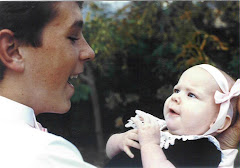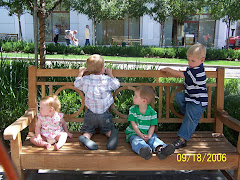All our eight children came home for Christmas this year. It wasn’t quite like the old day s because with them came four spouses, whom I love as much as my own children, and seven grandsons. We had a great time but the dynamic of married children, unmarried children, and grandsons was a little overwhelming. It made me feel like the juggler at a circus trying to keep all the balls in the air. Family unity took on a different meaning, as we were all together again under one roof. So when my husband put a mother-in-law joke on my desk after the holidays were over and everyone had left I wondered what he was trying to tell me. The title “mother-in-law” frequently invokes humor as an object of ridicule. Personally I’ve never found much humor in the jokes because I try to be a food mother-in-law or maybe because I had a wonderful mother-in-law.
We attend the wedding of our good friends’ son in Japan. Very different from a wedding here in the States, no gifts like toasters, towels or blenders are given to the wedding couple. Instead wedding guest gives money. The only gifts at the wedding are those given by the bride and groom to their guests who have impacted their lives. (That would be totally new concept for wedding her in the USA.) The bride and groom also change clothes there times during the party: first, wearing a western tux and while bridal dress; second, traditional Japanese attire and third, formal wear. The bride and groom are the center of attention while the parents who helped get them to this point in life sit with the audience. In fact, during the program the wedding couples’ employers spoke on the attributes and accomplishments of the bride and groom.
I share this with you only to illustrate how different, both in attitude and tradition, they are culturally from us here in the States. Yet motherhood is still motherhood. As we sat at the table with our friends, the groom’s mother expressed her concern regarding her new daughter-in-law and I found them quite familiar. Rumiko said, “I hope she can love me and our family. I hope I can find a balance in assisting them when needed yet staying out of their business. I hope she will support my son to maintain his Christian beliefs. I want her to share their children with us and not spend time only with her family. I hope she can make him a better person and not criticize his shortcomings or be critical of the way I raised him.” Her concerns continued but hopefully you can see where I am going with this. Motherhood is not cultural and has no language barrier or geographical boundaries. Rumiko is a different nationality but she is first a mother and has the same universal concerns every mother feels.
This experience aroused my curiosity and I asked my own children-in-law their own concerns when they got married and came into our family. I found their responses quite interesting. Here are some of them.
* I wanted to be loved and accepted.
* I wanted my in-laws to give us space and not give us unwanted advice.
* I wanted to be accepted and not criticized because of my family traditions or personality.
* I wanted them to see us as one.
* I didn’t want them to take sides when issues arose.
* I didn’t want them to compare me to others in the family.
What an eye opener this was for me, realizing that both children-in-law and parent-in-law want and need to same things. Acceptance and being loved was the major concern of both parties. Both expressed the desire to fit into the roles they now had.
Our actions can either welcome or alienate. Remember that if, from your point of view, your child married the wrong person, the best advice is to “move on.” Once a child exercises agency, it is then time to support that decision. No purpose is served in being negative regardless of the choice made. Accepting your child means accepting their choice of spouse just as a spouse needs to accept and honor their mate’s parents. Even the scriptures tell us that the couple should leave their father and mother and become one. To me that definitely sounds like a new family unit has been formed. We should respect the right of the new unit, as we want to be respected.
It should be the goal of the whole family to welcome the new member as one of their own. A friend shared with me this great example. It was the second marriage of her daughter who had a son from the previous marriage. Her new mother-in-law took the bride’s mother aside and said, “I want you to know how happy we are to have your daughter in our family and we look upon her son as an incredible bonus!” I personally can’t think of anything more touching and accepting. This wise mother-in-law gained instant love from the bride’s family by her kind words and actions.
Together my children and I came up with a list of things that will help build a stronger family unit. Here is our list that applies to both ends of the in-law stages. Read it. Add your own thoughts. Then I suggest that communication take place and principles be applied.
* In-law children were not raised in your home like your own child. Give them time to get use to you. Expect there to be differences and embrace them.
* Keep negative thought to yourself. Don’t let your children talk about their spouse negatively to you.
* Accept differences in the way their home is managed. Get ideas from them.
* Respect decisions made by your children and give advice only when asked.
* Don’t take sides when difficulties arise.
* Strive to make the new in-law one of your own. Seek out their interests, ask for their opinions, become their friend.
* Visit their home as a guest being excited about their life and achievements.
* When you call on the phone talk to both. Don’t keep secrets from one or the other.
* Be willing to share your child with the spouse’s family and encourage good family relationships there. Join in family activities and be interactive.
* Be sensitive to the in-law’s feelings. Apologize if you ever offend them but most importantly forgive them if they offend you.
I don’t often recommend books but if your family needs help in this area, Principles of Love, How to successfully Parent Your Adult Children, has practical ideas to help you. It is by Garth A. Hanson, PH.D.
Leo Tolstoy said, “All happy families remember one another, but each unhappy family is unhappy in its own way.” Wanting to be a happy family doesn’t mean only until a child leaves home. From my experience happiness in a family is constant work and needs to be guarded and worked on continually especially as family member are added.
Just a light-hearted thought with Valentine’s Day coming up… when remembering those you love, don’t forget to acknowledge “your children” who married the child you raised. It’s their happiness that guarantees your own child’s happiness and without that you just might get them back…and you definitely don’t want that!
Thursday
Subscribe to:
Post Comments (Atom)

















No comments:
Post a Comment